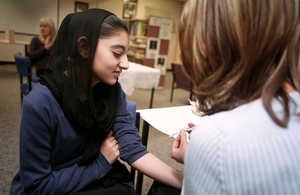Measles cases drop, but MMR still to catch-up
Cases of measles fell during June, with 113 confirmed cases across England.

Young girl being vaccinated
This is down from 193 cases in May, itself a drop from 299 cases in April, and follows the nationwide rollout of the MMR catch-up programme, jointly run by Public Health England (PHE), the Department of Health (DH) and NHS England.
Progress in the campaign has been monitored using data on the MMR status of children aged between 10 and 16 years old, gathered from around 2,000 general practices in July 2013. When compared with similar aged children in 2012, the numbers point to almost 60,000 previously unvaccinated children having now had one dose in England. Additionally, a slightly higher number have now completed the 2 dose course.
Screening and immunisation teams in each of the 25 NHS Area Teams across England have been asked to reinforce the work done so far by general practices to sustain the MMR catch-up, and to plan for additional efforts to identify those remaining unvaccinated children in the target age-range.
Dr Mary Ramsay, Head of Immunisation at PHE said:
It is still too early to be confident that the drop in cases has come from the campaign but we are making good progress towards the 95% target. Nevertheless, we must still continue with all of our efforts to identify and vaccinate any unvaccinated or under-vaccinated children and young people.
The next phase of the catch-up programme involves each Area Team planning additional activities appropriate to their circumstances. These plans will be based on local intelligence on MMR coverage in their communities, with interventions based on an assessment of their likely effectiveness. This may include schools’ based activities such as school nurse visits to schools and direct contact with parents.
Longer term plans for the elimination of measles will involve improving and sustaining the high coverage of MMR for younger children, and also implementing routine catch-up opportunities for older children – for example when changing schools or receiving other teenage booster vaccinations. This will ensure a long lasting legacy for future children and ensure that the catch up programme is not just a short term fix.
Professor David Salisbury, Director of Immunisation at the DH, said:
These figures are encouraging, but the best thing that parents can do, if their children have not had two doses of MMR, is to make an appointment with the GP before their children return back to school or college.
Ends
Notes to editors
- PHE has commissioned an audit which aims to confirm both the baseline level of coverage and the current level given the catch up programme so far. This audit will take information from the Child Health Information Systems in London and elsewhere, and review this against GP records for those identified as unvaccinated to confirm their vaccination status.
- The total target population of unvaccinated 10 to 16 year olds is around 300,000. The catch-up programme has a wider ambition to reach partially vaccinated 10 to 16 year olds (around 300,000) and unvaccinated and partially vaccinated children outside this age group (around 300,000).
- A total of 113 cases of measles were confirmed in England with onset in June 2013, making a total of 1287 cases since the start of the year. The region most affected is the North West. The age group most affected in June was age 1 to 4 years (26/113 23%), a change from the 10 to 14 age group affected greatly earlier in the year (last HPR report). The proportion of cases aged 10 to 16 years – the age group targeted in the campaign - declined in June to be lower than in any previous month since February 2012. Overall 257 (20%) of all cases in 2013 were admitted to hospital including 39 with complications including pneumonia, meningitis and gastroenteritis.
- Public Health England is a new executive agency of the Department of Health that took up its full responsibilities on 1 April 2013. PHE works with national and local government, industry and the NHS to protect and improve the nation’s health and support healthier choices and will be addressing inequalities by focusing on removing barriers to good health.
www.gov.uk/phe Follow us on Twitter @PHE_uk
UKHSA press office: National Infection Service
UKHSA press office, infectious diseases
61 Colindale Avenue
London
NW9 5EQ